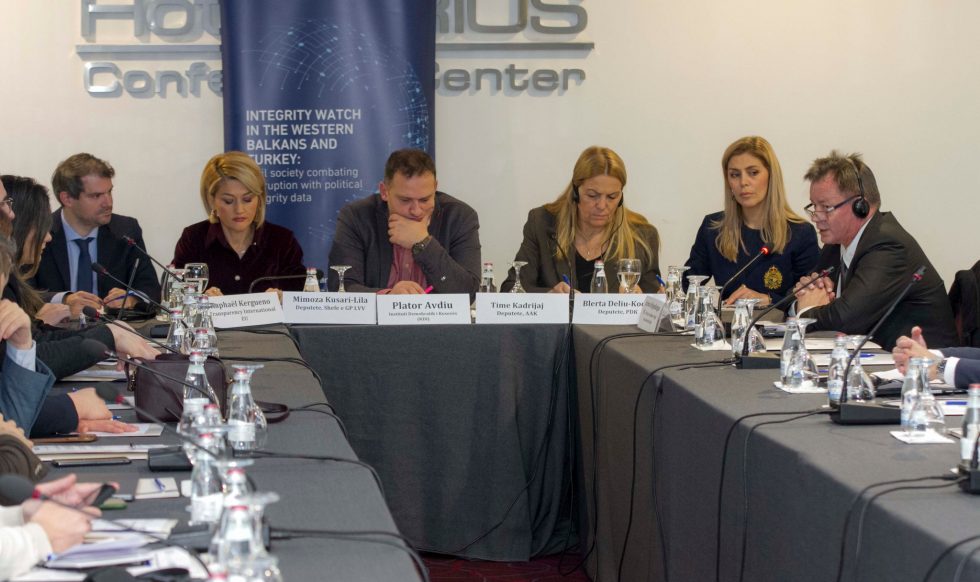


As part of the activities of the ‘Zero Corruption’ campaign, on December 5, 2023, the Democratic Institute of Kosovo organized the conference ‘Has the time come for a Law on Lobbying in Kosovo?’ In this conference, Members of Parliament (MPs) from the parliamentary groups (PG) of Kosovo, representatives of civil society organizations, media, and foreign diplomatic missions in Kosovo participated.
In the opening speech of the conference, Plator Avdiu, Project Manager at KDI, emphasized that establishing clear rules for lobbying is a crucial step in strengthening transparency and the legal framework for combating corruption. KDI believes that creating a legal framework is essential for a modern democratic society.
Following the discussion, Jarmo Helppikangas, Head of the Rule of Law and Legal Section at the Office of the EU Special Representative in Kosovo, expressed gratitude to KDI and Transparency International for what he described as a vital political discourse. He emphasized that lobbying is a common practice in democratic systems and plays a crucial role in shaping policies and decisions. Furthermore, he added that it is essential for institutions, including the EU, to be open, transparent, and cultivate regular dialogue with all relevant actors, especially civil society organizations. Since many countries adopt self-regulation, there is an urgent need for clear rules to govern lobbying activities. Creating a code of conduct provides legitimacy and transparency, making it an invaluable tool for any country engaging with the EU. Simultaneously, he stressed his personal belief that this is the right moment to start addressing this issue in Kosovo. He assured attendees of the EU’s readiness to provide support and technical expertise throughout this process.
MP Mimoza Lila-Kusari, Head of the Parliamentary Group of the Vetëvendosje Movement (LVV), emphasized the importance of defining strict norms within the Law on Lobbying. According to Mrs. Kusari-Lila, Kosovo faces a significant gap in accountability. The Assembly of Kosovo has yet to approve the Code of Ethics, posing an additional challenge in discussing the officialization of a process involving interest groups. She added that LVV, as the largest parliamentary group, views this as a complex process that further complicates current activities.
However, on this topic, MP Blerta Deliu-Kodra, representing the Parliamentary Group of the Democratic Party of Kosovo (PDK), expressed the view that PDK considers this initiative to be very important, albeit challenging to initiate. She referenced the case of North Macedonia, where, despite the approval of the Law on Lobbying, its functionality has not been entirely successful. She added that consulting the best practices of states that have successfully implemented such laws in their parliaments is crucial. Adopting these good practices would position Kosovo well in the adoption of such a law, strengthening the legislative agenda of the Assembly and giving weight to lobbying. She emphasized that many EU countries have regulated lobbying through internal regulations, and these developments align with the promotion of an open, transparent, and accountable Assembly. However, she noted that the main challenge for Kosovo continues to be corruption.
MP Time Kadrijaj, representing the Parliamentary Group of the Alliance for the Future of Kosovo (AAK), emphasized the importance of having a law that is in harmony with the conditions, circumstances, and modality of Kosovo. She added that AAK supports the initiative for a law on lobbying but currently lacks the necessary numbers to push it forward. Kadrijaj also mentioned that AAK is prepared to contribute to this initiative, but highlighted that the Assembly will require expertise and political consensus for the law to be approved in Kosovo.
Raphaël Kergueno, the representative of Transparency International EU, an expert on the issue, stated that the Law on Lobbying is rooted in EU practices and urged Kosovo to adapt and begin its implementation. He emphasized the importance of this initiative, noting that the EU welcomes such efforts. Lobbying is a common activity in democratic systems where people participate directly, and this law is based on Article 11 of the Europe Agreement. This article specifies that opportunities and measures must be provided to inform and publicly exchange information in all areas of the EU, along with its expertise. Moreover, he added that institutions should engage in open and transparent dialogue, establish clear regulations and rules, and avoid being influenced by other activities. Kergueno also highlighted that a perception has been created that lobbying is negative, but if all legal avenues are utilized, this process becomes crucial for a state. He stressed that lobbying groups must be transparent to the public so that they are aware of how their money is being used. Lobbying, as an activity, is legal and should be practiced transparently, as this is the only way Kosovo can wield influence in the EU.
#ZeroCorruption
#TheProgressWeNeed